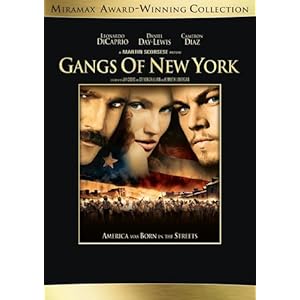
I'll be honest, I usually find historical epics to be pretty boring. Even the good ones could use some trimming. Leave it to Martin Scorsese though to create one that's gripping from the first second of its nearly three hour running time to the last. It tells the story of New York City before it became the mecca of human civilization it is today, when the streets still ran red with the blood of the many warring factions that vied for influence and their many victims. The film isn't a true story, but besides some embellishments it may as well have been. It stars Leonardo DiCaprio in his first of four collaborations with Scorsese as the son of an Irish immigrant and leader of the Dead Rabbits, and Daniel Day-Lewis as Bill the Butcher, the man who killed him. It starts with a war between two gangs for control of Five Points, a district in the city where the poor make do. The extremely bloody battle sets the tone for the rest of the film, establishing its main characters and their later motivations, as the plot quickly jumps forward to when DiCaprio's character has grown up.
The two best things about the movie are easily Scorsese's direction combined with the amazing work done to recreate 1800s New York and capture it on film, and Day-Lewis' performance. You could pretty much cut the protagonist out of the film and it could just be a great story about a leader of both crime and community in a city as it slowly develops into something resembling modern society. That's not really to slight DiCaprio, that's just how good Day-Lewis is. There's just something cool about the place the film creates, filled with hard men with curly mustaches, top hats, and razors and knives tucked into their clothing. And he epitomizes it with his glass eye and inscrutable nature. You never know if he's going to cut your throat or give you a pat on the shoulder. DiCaprio has his romantic foil, played by Cameron Diaz, can't quite measure up to his work, though they're perfectly fine otherwise.
The supporting cast is fantastic too, featuring recognizable faces in a variety of roles, supporting various sides as they see fit. Liam Neeson brings plenty of gravitas to the couple scenes in the beginning where he plays DiCaprio's father, which lends weight to later scenes where Bill shows clear ongoing respect for his former foe. The small time crew DiCaprio runs with features Al Capone from Boardwalk Empire and D'Angelo from The Wire, and Brendan Gleeson and John C. Reilly give interesting performances as former allies of Neeson who may no longer agree with his ideas. The film isn't without problems, of course. The entire third act is pretty messy, as though the screenwriters lost momentum and had to basically force things to make sure they managed to check off all the plot details they needed to to reach their conclusion. And that conclusion, while thematically appropriate, does result in a rather unfortunate anticlimax of an ending. With Scorsese at the helm though, all of those individual scenes manage to be good if not great, and he makes the problematic ending work because it's very clear what they're going for. He just knows how to make great movies, and this is certainly one of them.
Monday, October 31, 2011
Gangs of New York
Sunday, October 30, 2011
Movie Update 27
Three movie posts in a row? What the hell is this?
Assault on Precinct 13
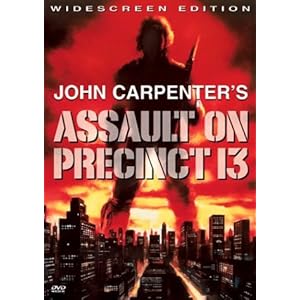
A pretty early John Carpenter film, which can be seen as a super violent action movie before super violent action movies were really a thing. It has elements of westerns and zombie movies, and tells the story of a few police officers and criminals defending a closed-down police station from a fraternity of gangs on the warpath. There are definitely bits of the movie I liked a lot, as it manages to build suspense and have some solidly exciting scenes despite a low budget. There are definite issues with the script though, which is a bit lean in some places and is filled with tough action dialogue that I could barely tolerate, especially for the lead good guy criminal. Stop being cute and act like a human being for five minutes, man.
Going My Way

A Best Picture winner starring Bing Crosby as a priest who comes to a new church and helps make it a nicer place, mostly by using his musical talent to keep it going and form a choir with its population of young boys. There's not really a lot of depth to the movie, but I found it mostly enjoyable. On occasion the musical numbers (it's not really a musical, but does have a lot of singing) seemed to go on a bit long, but in the end it's a nice tale of spirituality and kindness and whatever. I like Bing. Bing's a pretty cool dude.
Last Year at Marienbad
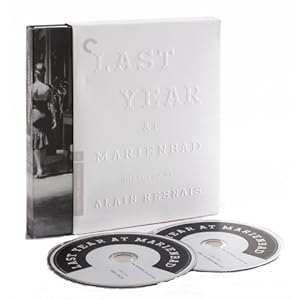
When people talk about incomprehensible foreign art films, this is basically exactly what they're talking about. Marienbad is a French movie about a man who tries to convince a woman that they had met and had an affair a year earlier at another place, and either he's making it all up or she just forgot somehow or she's deliberately pretending she doesn't know what he's talking about. The movie never really explains itself, and I don't think there really is a straight answer anywhere. It's not that the scenes don't follow or are made up of gibberish, it's just that it's really difficult to tell when things are taking place or where or what's real or if any of it is. I appreciated the great artistry that went into filming it, but I also can't say I really liked it. There's just no way to make heads or tails of it.
The Long Goodbye
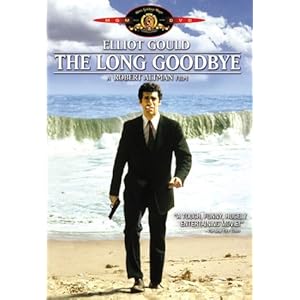
My favorite classic film noir might be The Big Sleep, starring Humphrey Bogart as Philip Marlowe. Robert Altman and Elliot Gould revived the character in the 70s with The Long Goodbye, moving him into that decade and highlighting the anachronism of a 40s hardboiled detective living in a then-modern LA. Some people don't like the way the movie plays with the genre or the deviations from the original novel, but I thought it was a mostly entertaining movie. It's also funny to see a very early appearance by Arnold Schwarzenegger as a thug who doesn't have any lines. Not a traditional detective story, but I think it's an interesting one.
The Phantom of the Opera
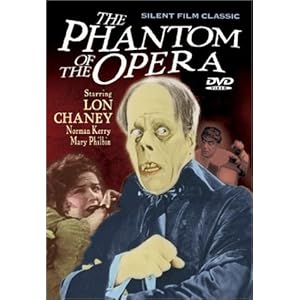
You know, I always got the impression that the Phantom was supposed to be a sympathetic figure, like his horrible visage masked a kindness and he was only secretive because of a life of torment, or something like that. But he really isn't. He kidnaps a woman and basically tells her he'll kill everyone if she goes back to her boyfriend instead of staying with him. Not cool, dude. This version of the story from the 20s is probably the best known film version, and it's pretty watchable, though not terribly exciting now. Lon Chaney's makeup is pretty good, but there's not much about the movie that's really scary. Not much of the good imagery from other silent horror classics. Still, probably worth checking out.
The Private Life of Sherlock Holmes

I guess there's some disappointment that when Billy Wilder makes a Sherlock Holmes movie that begins by teasing that its story will be surprising and possibly controversial, and the ends up just being a pretty normal Sherlock Holmes movie. In fact, the entire opening sequence where he lies about his sexuality to get out of a jam and which is the only thing that's truly original about the story, ends up being kind of a waste of time as it only barely plays into the rest of the film. It's not a big deal though, because it's a well paced, interesting mystery for Holmes and Watson to solve, with plenty of clues that seem odd at first but end up coming together to make a strange sort of sense. No Moriarty here, but we do have Christopher Lee as Mycroft, which is pretty delightful. Not an outstanding movie but a fun one. Not sure about the new Guy Ritchie sequel, though. Is it just me, or are none of the jokes in the previews actually funny?
Rome, Open City
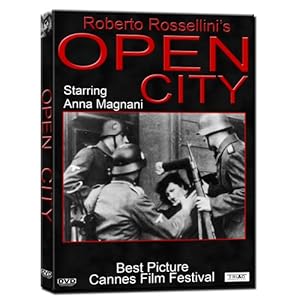
Italian neorealism! Catch the fever! Open City is remarkable for its depiction of the late Nazi occupation in Italy only months after the war actually ended, and for how unflinching it is in depicting the period. They didn't experience some of the worst horrors of the war, but it sure wasn't fun to resist the Third Reich at any point during their reign. The film suffers a bit from Italians Yelling a Lot Syndrome, but it's a well crafted piece of historical fiction, and I'm still impressed by it following so soon after the actual events it tries to reflect. A solid way to help kick off an important film movement.
Friday, October 28, 2011
Movie Update 26
Sometimes movies are all you really have to talk about, you know? You've got other stuff going on, but there they are. Movies.
The Cabinet of Dr. Caligari

One of the original horror movies, and a pretty good one. Dr. Caligari is notable for its early use of a twist ending and famous for the abstract design of its backgrounds, but it would be pretty effective even without those. The story is a bit slight, but the movie tells a fairly entertaining tale about a Frankenstein-esque mad scientist and his murderous somnambulist creation. Some nice creepy images, and just a solid mood that would help lead to more sophisticated takes on the genre concept. An important silent movie that manages to be watchable.
My Darling Clementine

Another black and white John Ford western, though I really didn't like this one as much. It had some nice scenes, but it was mostly just kind of slow. Henry Fonda plays an amiable Wyatt Earp, but that's about it. It's the story of the OK Corral, with a lot of inaccuracies and changes that don't really improve the drama of the story or make it more interesting. Ford knows how to shoot movies, and for its age Clementine is well shot. But sometimes he just forgets to make a truly entertaining movie, and this is one of those times. I think Westerns are among the genres most hurt by being confined to 4:3 black and white boxes, and while it didn't bother me much with Stagecoach, I think it definitely was to this film's disadvantage. I would have liked to have seen how it would have turned out ten years later.
The Palm Beach Story

Like the other Preston Sturges movies I've seen, Palm Beach Story is kind of weird. It's more overtly weird though, in that the plot ends up being completely silly. It's a pretty normal screwball comedy featuring the guy from Sullivan's Travels and the girl from It Happened One Night, only their story is one of a marriage falling apart rather than one coming together. Of course things end up about how you'd expect for them, but the ending kind of throws that away with a kind of bizarre plot twist. Like other Sturges movies it has solid actors delivering a lot of fun dialogue very quickly, but there's not much else besides that.
Pierrot le Fou

Sometimes I wonder who determines whether a film will be internationally known by its original title or a translation. It took a few tries, but I found a Jean-Luc Godard film that I really like. Fou combines some elements from other work by him that I've seen, like the vibrant yet natural cinematography of Contempt and the existentialism and fourth-wall breaking of Breathless, but puts them in a story I actually found interesting. The star of the latter film and Godard's eventual ex-wife play a couple that runs away from their responsibilities and some Algerian gangsters with a bunch of their money. It's not quite as exciting as that sounds, but the course of their relationship is intriguing and it's just kind of a fun movie to watch. Definitely very French, but not in a bad way.
Monday, October 24, 2011
Movie Update 25
Seems sometimes like all I do is watch movies. But that's not true.
Amarcord
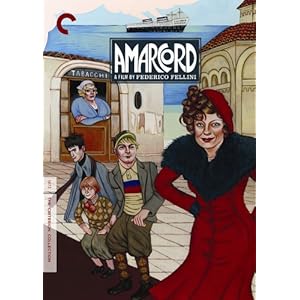
One of two films by Federico Fellini I saw this weekend, and the first I've seen in color. It's more autobiographical than his other work that I've seen, and thus more prone to not actually having a plot. It shows the crisscrossing lives of many people living in a small Italian village over the course of about a year during Mussolini's time as dictator. It pokes a lot of fun at the politics at the time, when it's not just depicting small town living. It's a fairly amusing film, but it didn't really grab me. I'm not against simple slice of life stories, but for whatever reason I wasn't really drawn into this one. Nicely done, but not much impact.
Au Hasard Balthazar

A good way to depict suffering and cruelty is to inflict it on something that's completely innocent, and that's what Robert Bresson does in Balthazar. It shows the parallel lives of a young farm girl and her family's pet donkey, as they grow older and face the harsh realities of growing up and being subject to the whims of someone stronger than you. I focused mostly on the donkey, just because it's such a pitiable creature and it's hard to watch what people do to it just because they can. If you want a prime example of a foreign art house movie that shows what's wrong with humanity without hitting you over the head with it... well, here you are.
Rio Bravo

Rio Bravo was made as a response to High Noon, which some such as Bravo's star John Wayne saw as un-American. It has a similar premise of the sheriff of a small, dusty town facing the looming threat of a criminal preparing to come and cause trouble, but rather than asking the town he protects for help, he faces the threat head-on. Of course, he has a couple buddies who are even better with a gun than him, and in general the town just treats him better. I liked Rio Bravo about as much as High Noon. Its approach is different, but it's a more entertaining, if less intense Western. The cast is solid, and Howard Hawks' direction is spot on. I liked High Noon because it was different from most films of its type at the time, but there's value to something just being well made too.
Stagecoach

John Ford's first sound Western, and the breakthrough movie for John Wayne. Solid character actors like John Carradine and an Oscar-winning Thomas Mitchell appear as well in nice roles. A stagecoach tries to make it through Apache territory to a town where Wayne's Ringo Kid intends to face down the man who murdered his loved ones, but there's a marshal riding shotgun who wants none of it. Parts of the movie are a bit slow, including the ending, which took a bit too long to resolve all of its little plot threads. There's some really good stuff here though, with Ford's direction seeming to be ahead of its time. A long chase through the desert that makes the film's climax in particular is just a brilliantly done sequence, and is easily one of the best action scenes from the era. One of the most important movies in the genre.
La Strada

The other Fellini movie I saw, and my favorite work by him. It stars his wife Giulietta Masina again (or first, as this was made the year before Nights of Cabiria) as a slow but well meaning girl who gets sold by her mother to a traveling strongman after her sister who filled the same role dies. She shows obvious talent as a clown, but when the two join a circus and a conflict erupts between him and a fool, bad things start happening. It has a predictably morose ending, but the journey there is at times heartwarming and devastating. Comparisons have been made between Masina and Charlie Chaplin, and I definitely see it. She definitely has that physical comic sensibility, and her character is the naive sort that reminds you heavily of the Tramp. Really good performance, even if there's no scene as great as the end of Cabiria.
To Be or Not To Be

A comedy made during World War II, depicting a troupe of Polish theater actors that use their stage talents to try to sneak their way out of their city, which has been occupied by the Nazis. It's a delicate balance between making fun of Hitler and Germany without ignoring the truth of the situation, even if at the time the full extent of what they were doing wasn't known. Still, I think it works as a comedy and as something that could lift spirits in the face of a devastating war. Carole Lombard unfortunately died in a plane crash a couple months before this was released, but it would be a fitting final performance for just about anyone.
Sunday, October 23, 2011
The Witcher 2: Assassins of Kings
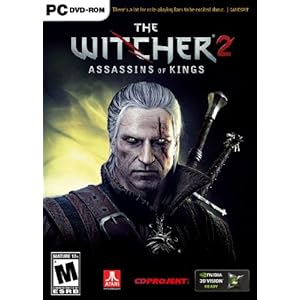
I really liked a lot of what The Witcher did, but some issues with its pacing and technical prowess prevented me from loving the game. This year's sequel isn't flawless, but it does address some of those problems, and really cements the series as one of the premiere action RPG franchises in gaming. Not every change was welcome, but I think overall Assassins of Kings is a better game than the original.
The game begins not long after the first ends, with Geralt protecting the king of Temeria during the siege of a castle. The game introduces you to its systems without much hand-holding, before things take a bad turn and you're more or less on your own again in a backwater town with not much equipment and even fewer friends. You can use a save file from the first game when you start off, though its greatest effect appears to be just giving you the nice equipment you had when you finished, with the actual consequences of your decisions being subtle if even present at all. I sort of like the way the game just throws you right into the thick of it, but they might have taken it too far by limiting the information on how you play it to small dialogue boxes on the side of the screen that disappear quickly and are easily missed in the thick of the exciting prologue. Thankfully the team added a proper, separate tutorial mode as part of a big free update last month, which I waited for and made the game's new systems a lot clearer.
The combat will be somewhat familiar to people who played the first game, though it's different enough that the tutorial is useful even for experienced players. You still have two swords; a steel one for men and a silver one for monsters, and you still have the five magic signs from before, with slightly altered mechanics. The different stances for different types of enemies are gone, replaced with a more action-oriented control style that lets you mix and match quick and strong attacks and move around much more freely. You also can equip various throwing knives, bombs, and traps, and use them more easily in combat than before. It definitely increases the skill required to play the game, especially since Geralt seemed kind of gimped early on until you unlock some abilities, such as ones that allow you to block attacks from any direction and do actual counter-attacks. I mostly stuck with the combat path as I leveled, though there are also the magic and alchemy paths if those interest you, which might require more forethought but are still viable. Changing the combat from basically a button-timing game to a system that requires more thought and twitch skill might not be welcome to everyone, but I thought it worked.
How much the game feels like a real RPG sort of depends on how much you want it to. I mostly stuck to the main path and focused on improving my sword skill, which made the game sort of like a Mass Effect 2-style action game that happens to have a long story and a lot of decisions to make. There are lots of side quests to pursue though that I only pursued when I ran across them, and there's also a lot of crafting and upgrading options that I mostly ignored. The decisions were the main thing that reminded me of the type of game I was playing though, especially because of how deeply they impact the course of the story. Few games really even attempt dynamic plotting like this, and the game would be remarkable for its ambition even if it didn't work. Some games of this type are content to keep the main critical path of the game the same for everyone, with the major changes being events that might have a different outcome in the moment and a slight consequence later on. Other games focus on giving you freedom and let you approach the story at your own pace, but when you do approach it it's basically the same. The Witcher 2 is very linear, but there are a number of points where a decision you make affects events not only in the short term, but how the rest of the story might play out. The flow of time will remain constant, but the players involved and their motivations could be totally changed. It's not handled perfectly, but when it works it's impressive.
And it's an interesting story too, if not the best told one. I often felt like I was supposed to know kingdoms and nobles even when I didn't get a proper introduction, and I don't know if the game was expecting me to read up on these people in the journal or be familiar with the books the series is based on or if they were just throwing me into the middle of a complicated conflict on purpose. It's easy to get lost in the family trees and the history the game is always throwing at you, but if you strip that away, there is a plot there that's a pretty decent little fantasy tale, combining elements of political intrigue and powerful sorcery in a way that pulls you into its dark and unusual world. I've genuinely come to care about the characters that carried over the first game, and I'm invested in Geralt's attempt to regain his memory, and I'm intrigued by this grand new conflict that he's gotten caught up in, even if like him, I don't understand all of it. The presentation really helps, too. The game looks pretty outstanding even though my PC isn't top of the line, combining a nice, gritty, distinctly European fantasy aesthetic with an impressive graphics engine. The voice acting is good, especially when you consider it's being translated from the original Polish, and the original score (which I'm listening to right now) is well executed if a bit safe.
As I mentioned before, the game isn't perfect. I didn't have the same problem with the ending having trouble getting on with it; in fact it's about as perfectly paced an RPG I've played. You have two nice, lengthy acts with plenty of opportunity for screwing around, before the plot reaches its climax and resolves itself with proper speed. The problems are more mundane technical ones, and they're unfortunate when so much else of the game is put together very well. The first game is difficult at times, but I never got angry at it, because I always was able to find the right combination of techniques and equipment to get through it. There were moments in the sequel though that just seemed way out of line with the rest of the game. There's challenge, and then there's enemies that are just too difficult to damage or come in groups that are too large. I was also kind of disappointed in the enemy variety; you'd think a game about a monster hunter by trade would have a few more kinds of monsters. Maybe there were more in the various hunting contracts you can pick up, but if you focus on the main plot like I did, you see a lot of the same ones. The game also failed to use the Steam overlay for reasons I could not ascertain even though I bought the game through Steam, and the scripting in the stealth sections seemed to break when I actually tried to play them. Early on there's an objective to sneak somewhere, but if you get spotted you get brought somewhere else and the story changes. That's fine, and actually interesting. But later, getting caught means you die, which means I have to reload. And every time I did, enemies would fail to act the way they should, and there would be some glitch with the sound, causing most of the effects to disappear until I went to the main menu and reloaded the save. This occurred on a couple other occasions as well.
It seems like these are the kinds of problems that would be easily noticed in play testing and should be addressed, which is what makes them seem worse than regular glitches. Ultimately they didn't hurt the game too much for me though, which is good, because I wanted to like it as much as I did. It's clear from the course of the story as it draws to a close, and also from the solid sales numbers for a game like this, that there will be a third game at some point, and it's only a matter of when. I look forward to its inevitable release, though if I wanted more right away, I could always go back and try the other half of the game that I missed.
Wednesday, October 19, 2011
Movie Update 24
Would you believe I've seen a few more movies since the last time I wrote about a few movies? The first three of these are the second film I've seen by their well-regarded directors, and the last is the first by another.
All About My Mother

This is a movie that could have gotten unbearably depressing, but something about the colorful way it looks or its deeply human characters or the faith it has in humanity or something kept it watchable, and made me really like it a lot. Pedro Almodóvar seems to be a director's who's a lot more in tune with women than many men in his profession, and even dedicated the movie to them at the end. It's about a woman who loses her son, and then journeys back to her old stamping grounds, where she meets some old friends and makes some new ones. Penelope Cruz is the only one I remember seeing anywhere before, but they almost all instantly become likable, even if they're flawed as people, and it's an interesting movie just to watch. A lot of bad things happen, but hope never completely runs out. At least that's what I took from it.
Chungking Express

Wong Kar-wai employs a very unusual structure with this film. It's not that weird to split a narrative between two different and only tangentially related stories, but it's a good deal weirder to separate them almost completely in editing, with one going through all its paces and then wrapping up before there's a quick transition to the second. They're both love stories featuring lonely policemen and a snack bar, and they both have thematic similarities, although there are definite differences as well. I don't like all of the choices Wong makes, such as the low shutter speed effect when things are happening quickly, but it's mostly a well made, well acted drama. Wong impresses me about as much as any Asian filmmaker who's still working.
Contempt

Made only a few years of Jean-Luc Godard's Breathless, Contempt sure looks a lot different. It's in widescreen and color, and the differences don't really stop at an aesthetic level. It's a very natural film, examining the breakdown of a screenwriter's marriage while he's also struggling with his current project. He's rewriting a script for an adaptation of The Odyssey (why hasn't their been an actual legitimate film version yet?) which is being directed by German auteur Fritz Lang (playing himself), and he finds himself disagreeing with his boss and then his wife after she meets him. A lot of the film is just the writer and his wife talking, evading the issue of what's really going on while being cruel to each other. It doesn't sound that exciting, but Godard does some really interesting things with the presentation of the material that makes up for it. You can read a lot of symbolism and analogy into it, or you can just enjoy the impressive cinematography and Brigitte Bardo's figure.
Written on the Wind

In the past, critics have looked at Douglas Sirk's work in two different ways. When he was contemporary and his films were making money in theaters, he was criticized for making old fashioned, overwrought melodramas. Later though, others saw a certain irony in what he did, like he was prodding at the falsehood of the American dream without calling too much attention to it. Watching the movie, I could see it both ways, but I would tend to agree with the more recent interpretation, because I have a hard time believing someone who was so good at creating images on film could be so bad at depicting human interaction in the world of 1950s cinema. Maybe he just lucked into great directors of photography, but in any case, the irony is there, whether he intended to have it or not. Written on the Wind is a big movie with big emotions, and it's interesting to look at the absurdity of rich people at any point in history, so I had a good time watching the film and wondering about its real intentions. It's not perfect, but I'm pretty sure I liked it.
Tuesday, October 18, 2011
Drive

The best word to describe Drive might be "specific". It is very specific in its style and the tone it tries to create, and you have to have a very specific mindset to enjoy it appropriately. Because despite what you might assume based on the trailers, it is very much not a typical thriller or car chase movie. I would call it moody and intense before I'd call it exciting, and I would say it's much more plainly violent than action-packed. Tension is built through the careful application of suspense, of waiting for something terrible to happen until it finally does, rather than with fast editing and big special effects. There are all of two scenes in the film that could be called legitimate car chases, and only a brief third one that I would really call action at all. The scenes are masterfully done, telling you a lot about the main character and delivering moments that really quicken the heart-rate, but that's about as far as it goes on that direction. The rest of the movie is more of a character study, broken up by flashes of brutality that let you in on how badly the driver's world gets turned upside down when he steps outside his normal routine.
That driver is played just about perfectly in my opinion by Ryan Gosling, who portrays a nameless, quiet young man who hides his capacity for ruthless self-preservation under a calm, if slightly disquieting demeanor. Gosling, his costar Carey Mulligan, and director Nicolas Winding Refn spent a lot of time trimming out dialogue where they thought the film didn't need it, and the lack of speech is a big part of the creation of the character. He doesn't say much unless he has to, and even then his sentences are as short as possible. It makes him seem unusual, almost like he might have some sort of slight social disorder that prevents him from being normal. It's most pronounced in his scenes with Mulligan, a neighbor with a young son and a husband in prison that he develops feelings for, who also doesn't talk much, making their relationship a very simple and sweet one. Some people have said that Gosling is just too pretty to pull off a tough guy role, but I think his looks actually benefit the character. They help explain why someone might find him charming and attractive even though his conversations consist of little more than a few words and a smile, and they also make the revelation of his darker side more stark and surprising. The rest of the cast supports him very well, most notable Bryan Cranston as his talkative mentor and Albert Brooks as a gangster who's menacing in just how indirect the threats he makes are.
I haven't said much of anything regarding what the movie is actually about. It's pretty simple, really - Gosling does stunts for movies and works in a garage by day, and occasionally works as a getaway driver for crooks at night. He gets involved with a job that goes bad, and failing to extricate himself and his new friends from danger peacefully, is forced to resort to much harsher means of protecting them. It's a basic crime movie plot, which succeeds in driving the action without getting in the way of Refn's direction, which is what made me truly love the film. The film is dripping with style, from the expertly crafted moments of violence to the uniquely slow paced character moments to the memorable way they shoot LA at night to the singularly memorable soundtrack, which features songs that sound like they were produced 25 years ago but match perfectly with the character's identity. Drive is a movie where I can see why a lot of people would not respond well to it, and I can only feel sorry that they aren't able to enjoy a movie that's not quite what they expected. It's so sure of itself in every aspect, and so mesmerizing to watch that even tiny moments that don't completely work are easily forgiven. It's one of the best movies I've ever seen in a theater. That's a significant caveat, but one that shouldn't detract from the message that I thought the film was brilliant, and it's still in my head a couple days after seeing it.
Monday, October 17, 2011
The Legend of Zelda: Ocarina of Time 3D
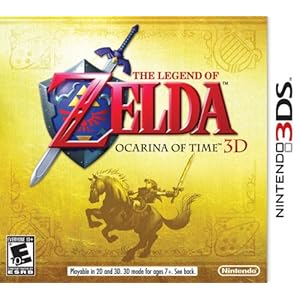
The Legend of Zelda: Ocarina of Time was a classic practically the instant it was released, and it still holds up as a fun adventure today. It's been repeatedly re-released over the years, but its port to the 3DS handheld brings some substantial new changes, including ones that don't involve a third dimension. It features the Master Quest from the Gamecube version, which changes up the dungeons and has to be unlocked by completing the original game, and has various tweaks and additions that either improve the gameplay slightly or give a little more help to people who need it.
If you somehow haven't played the game before, it set a lot of standards for 3D action adventure games. It has a targeting system that lets you keep an enemy in your sights no matter where you go, it features a meaningful day and night cycle that affects your options at a given time, and it brought the concept of dangerous, puzzle-filled dungeons into a more modern era in a way a lot of games still copy. It had a couple small flaws though, flaws that this remake weren't afraid to address. The dual-screen set up makes checking the map and your equipped items a lot quicker, and the map now has more useful waypoints for side activities. Boots are now considered items instead of gear, making switching them on and off in places like the Water Temple a lot simpler, and you now have five item slots instead of three, including one that's dedicated to your always-useful ocarina. A couple of the slots require using the touch screen, but it's a worthwhile trade-off. You can also look or aim weapons in first person by physically moving the 3DS, which makes things that require it easier, especially if you're sitting in a rotating chair. Another addition is a new kind of statue that you can find and use to view video hints for various puzzles that might be sticking points for people who aren't already intimately familiar with the game. I sort of missed the rumble in certain spots, but at least they found away around that issue with the stone of agony.
The audio sounded pretty much exactly the same to me, but visually the game is a nice upgrade from the original version, even if you ignore the 3D effect (which I enjoyed, except for a couple moments where objects were very close to the screen). It may seem to look the same as it used to, but if you actually compare them, this port is a lot sharper and nicer looking. It basically looks the way your rosy memories of the original game are telling you it looked. Some objects are redesigned to take advantage of the hardware, and lots of things, especially characters' faces, are just a bit nicer to look at. When you combine the better aesthetics with the small gameplay improvements, I have a hard time picturing myself wanting to play Ocarina of Time again in the future and not picking this version. I wouldn't exactly call it definitive, because for some people sitting on a sofa in front of a TV will always beat staring at a tiny screen embedded in a less-than perfectly ergonomic handheld. But it's hard not to love a technically superior, portable version of one of the best games ever made.
Friday, October 14, 2011
Movie Update 23
Jeez, why wouldn't I want to write about these movies? They're all pretty quick, with the longest only lasting 91 minutes.
Black Girl
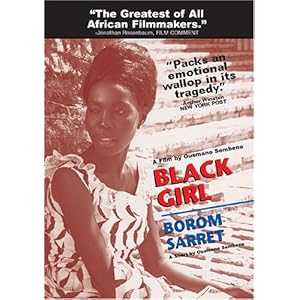
A movie in French about a girl from Senegal who is hired to be a nanny for a white family, but when she is brought back to their regular home in France, realizes how poorly they think of her. Her job changes to a more demanding and less interesting one, and the mother kind of treats her like crap, constantly demanding things of her, berating her, and not even letting her wear nice clothes in the house. Eventually she gets fed up with the treatment and takes drastic action. It's less than an hour, and the plot is slight even for that time, as a lot of it is just shots of her cleaning or cooking while narrating how much her life sucks. But there's something likable about the film, in the simple way it was shot, that makes it work.
Earth
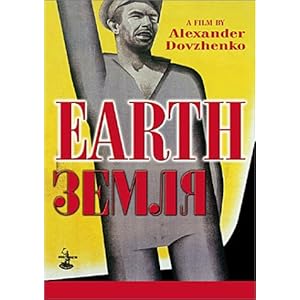
Another silent propaganda film from Russia like The Battleship Potemkin, though less plot-driven and more focused on creating mood and imagery. It's very dreamlike, and a unique viewing experience, though one that I was mostly bored by. I can't really see this movie succeeding in actually getting a lot of people passionate about its message. It's certainly an important film in terms of developing styles other people would borrow from, but there's not much else I took from it.
Videodrome

A bizarre little horror film by David Cronenberg, starring James Woods as the executive in charge of a small TV station that specializes in sex and violence. He is shown a pirated program that he becomes fascinated by, and is drawn into its world before realizing the true intent behind its creation, which is strange and sinister. I wasn't really scared much by the movie, but more intrigued by its practical effects, which are still effectively gross today, and by its weird, twisty plot. Based on limited experience, I don't think I like young body horror Cronenberg as much as older psychological Cronenberg, but it's an enjoyable movie anyway.
Viridiana
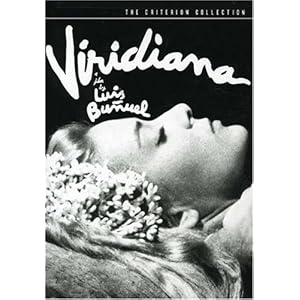
It's interesting to see the kind of movies that would get banned 40 or 50 years ago and wouldn't cause much of a hoopla at all these days. There's definitely some messed up things that happen in Viridiana, but the way they're portrayed is pretty subtle, or at least non-graphic enough that it would be hard to justify censoring it. It's about a woman who's about to become a nun, but gets drawn away from that life and eventually takes in several disabled beggars to help with an estate. You can read an anti-altruism message into it, but I'm not sure if that's really an agenda Luis Buñuel has or just something that happens in the movie. Like many black and white movies from the 60s, it's also really nice to look at.
Bonus Movie! Un Chien Andalou
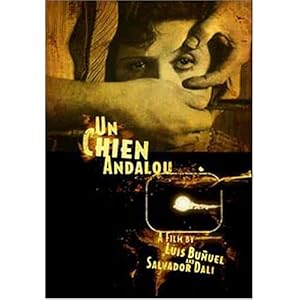
Buñuel's first and probably most famous film is this, a short he wrote with Salvador Dali and directed. I had already seen the famous eye scene before, but this was my first time watching the whole thing. It's incredibly watchable for a surreal silent movie made with the intent of not having any of it actually mean something, with a big part of it probably being that you only have to sit through fifteen minutes of it. Lots of great off-the-wall images and cute visual trickery strings together a bunch of nonsense scenes with little connecting them beyond title cards that probably hinder understanding more than they help it. Definitely something anyone who's into film history should see.
Monday, October 10, 2011
Breaking Bad - Season 4

For the third straight year it seems that television can be broken down into two categories: Breaking Bad, and everything else. The show wasn't as filled as last year was with wall-to-wall insanity, taking more of a slow-burn approach to the story this time, framing the whole season as one big, terrifying game of chess. Walt wasn't quite as front and center as he'd been in the past, with his character frequently getting emasculated and sidelined, while allowing the other characters more of an opportunity to shine. With Walt not really understanding the consequences of what he forced Jesse to do last year, a rift forms between them, and Jesse ends up developing a bond with Mike that's one of the most interesting aspects of the season. We learn a lot more about Gus, both who he is and why he is to a force to be reckoned with. Skyler is forced to take a larger role in helping Walt cover his tracks, and starts to realize just what kind of mess Walt got them into. Hank is still recovering from what happened last season, and we get to see a lot of different sides of him over the course of these episodes, even if he's still hobbled by the end.
There's a lot of character development that occurs, and lots of false starts and pieces being moved into place for most of the season. People who are only into the show for its crazier side might be a bit disappointed in that. It's all worth it though, because eventually the tension that's been building all season between Gus and the cartel, and Walt and Gus, and Walt and Jessie explodes in the last four episodes, which all easily rank among the show's (many) best. People die, things explode, plot seeds that have been growing into plot plants get sown, and it's all done in the show's signature style, combining humor with harsh, occasionally otherworldly violence and a directorial flair that no other TV series even attempts. The show's still as good as it's ever been, and now that we know the ending is only 16 episodes away, it's hard to put away my excitement for what will hopefully be one of the best conclusions to one of television's best series. All the pieces are in place for something great, and I have confidence that this show's fantastic writing staff, cast, and production team will put it all together once again.
Sunday, October 9, 2011
Movie Update 22
Another weekend of movies. A couple of these I really liked, a couple I didn't.
The Birth of a Nation

It's kind of hard to separate how important this movie is in terms of setting standards of filmmaking that would be followed for a long time, and how horrible the content of its second half is. The film is in two parts, the first of which depicts The Civil War, and ends with Abraham Lincoln's assassination. The second part is about reconstruction, which could have been an interesting subject if handled appropriately. It wasn't though. Black people are portrayed by white actors in make-up, and shown to basically impose their will on the poor white southerners, ruining everything and even trying to steal their women. Eventually the Ku Klux Klan manages to restore order by running out the vile usurpers and their enabling carpetbaggers. It's both inaccurate and terribly racist. Pretty hard to defend.
The Conformist

It's kind of hard to describe why I thought this movie was great, but there was just something very gripping about it. It's a very artful film depicting a member of the fascist party in Italy who is charged with assassinating an old professor who fled to France. He decides to do the job while on his honeymoon, and things get kind of messed up when he also falls for the professor's young wife. The movie uses violence very effectively, with it only being a factor in a couple scenes but having a huge impact every time. Bernardo Bertolucci probably gets a little too obsessed with depicting sexuality in his other movies, but it's wielded effectively here to set a specific mood and explain the film's characters without being too obvious. Definitely not for everyone, but I was into it.
The Leopard

I was enjoying myself with this movie for a while, but I eventually realized that it wasn't actually going anywhere and it started to seem like a waste of time. I think you can tell a story about the lives of royalty and what they experience when the nation they live in starts an inevitable shift towards a more modern form of government in less than three hours, but the director was more interested in painstakingly filming all of the lavish sets and costumes than doing that. It's a beautiful movie, but it just loses momentum at some point. It starts out pretty competently, with a rebellion and a love story, but eventually they get to a ball and it kind of just stops. Weird to watch the life drain out of a film like that.
The Verdict

A David Mamet screenplay directed by Sidney Lumet and starring Paul Newman is a formula for a great movie, and that's pretty much what they made here. Newman plays an aging, alcoholic, ambulance chasing lawyer, who sees a chance to redeem his career when he's given a case concerning a woman who was improperly anesthetized before surgery and then fell into a coma. He's up against a large firm and doesn't have much of a case to work with, but he still brushes aside opportunities for compromise, even against the family's wishes, all in the belief that what he's doing is right. It's ultimately a pretty simple film with a predictable ending, but it works because of the three guys I mentioned. Newman's performance is simply fantastic, not shying away from the character's severe flaws but still coming off as a guy worth rooting for. Lumet doesn't try anything too flashy, but every long shot seems carefully considered and just right for the scene. Definitely one of the best courtroom dramas I've seen.
Saturday, October 8, 2011
NTSF:SD:SUV:: - Season 1

NTSF:SD:SUV:: is a spin-off of Childrens' Hospital (in our universe, within the meta-fiction it's just another show in their nightmare world of silly, generic network TV shows taken to an extreme), and while it hasn't managed to become as good as that series yet, it's still a lot of fun and has enough promise to turn into a similar coming together of strong writing, a great cast, and a bunch of off-the-wall ideas. Paul Scheer stars as Trent Hauser, the lead agent of an anti-terrorism unit that protects San Diego from all manner of bizarre crimes. Captain Janeway from Star Trek: Voyager plays his boss and two-time ex-wife with an eye patch, Martin Starr plays a computer expect who's not much of a character but still does a good job, and Rob Riggle plays the nutty President of the Navy. Peter Serafinowicz does the voice of the their robot assistant, and a couple people I don't really know play fellow agents, one who constantly makes reference to his native Alaska and another who ably fills every possible cliche of a female lead in a cop show.
Besides the main cast, there's plenty of great talent in the guest cast from week to week, like Jeff Goldblum as a high-stakes gambler who makes full use of jurisdiction laws and Adam Scott as a rival to Trent who's confined to a wheelchair. The cast frequently props up episodes even when their plots are a bit bare and reliant on a single wacky joke. Most of the stories are actually pretty familiar if you've spent any time watching shows like this, often with just a couple little tweaks that push them into the realm of the fully ridiculous. Once in a while they'll go for broke with an alternate universe episode or something, but a big part of the fun is how close the show really is to what it parodies at certain times. I'm definitely looking forward to seeing what they can do now that they're more familiar with what they can get away with on Adult Swim.
Thursday, October 6, 2011
Movie Update 21
Ali: Fear Eats the Soul

A German film that is somehow both very deliberately filmed and very quickly over. It tells the simple story of an older cleaning lady and a Moroccan immigrant laborer who find each other so nice that they decide to get married. They quickly realize the problems this causes when they are both ostracized and ignored by those they know, though the woman Emmi receives the brunt of the mistreatment. Eventually most people come to understand their relationship, though it happens just as it begins to splinter on its own. I really liked the plain way the movie was shot and acted, though it was a bit too sterile for me to really connect with any of it.
The Battleship Potemkin

I sort of assumed this movie would just be boring Bolshevik propaganda, but it's actually one of the most watchable silent dramas I've seen. It has a pretty short running time, and it tells the fairly interesting story of a battleship's crew rebelling against their horrible conditions, and the support they received from others. The sequence on the steps of Odessa is one of the most famous in film history, but it's far from the only memorable scene in the movie. It's just very well shot and edited together for something from the 20s, and unflinching in its depiction of their side of the story. Certainly something that can be enjoyed outside of film school.
The Manchurian Candidate

Partway through this original adaptation of the novel, I was sort of shocked by what I was seeing. An adequately filmed, mostly exciting fight scene in a movie from 1962! I had forgotten that From Russia with Love did the same thing only a year later and with better execution, but still, it was nice to see. It was just part of a pretty good political conspiracy thriller, featuring an elaborate plot by the Communists involving brainwashing of Americans who don't sound like Americans and manipulating dumb politicians. The story cuts a few corners to get where it needs to go, but ultimately it's a great, pretty early example of a darker sort of thriller that would eventually become more popular. Frank Sinatra didn't come off as a very good actor, but at least he had Janet Leigh to bounce off of.
Notorious

The other Alfred Hitchcock films I've seen to this point were either great or Psycho, so it was interesting to see something in between. Notorious didn't quite have the visceral thrills or shocking twists of some of his better work, but it's still a really well-done film, with some excellent sequences and one of his best casts. The most famous scenes involve a remarkable shot panning from the top of a stairway to a key in a woman's hand and a romantic moment that skirts regulations about the length of on-screen kisses allowed through a clever loophole, but the moments that struck me most were when its main characters were in the utmost danger while they were doing nothing but standing or walking calmly. With how bloody and loud movies tend to go these days to be exciting, it's fun to be reminded of how much Hitchcock could do with so little. Probably a really good second-tier movie for him.
Tuesday, October 4, 2011
The Legend of Zelda: Four Swords Anniversary Edition

There's been a lot of Zelda stuff going on this year, being the 25 anniversary of the original game's release in Japan. The 3DS saw the release of a 3D remastering of Ocarina of Time, the first two games were included in the batch of free downloads that early adopters of the system got, and later this year we'll get to play the first new console game in the series since 2006. The most recent part of the celebration was the release of the (temporarily) free Four Swords Anniversary Edition for download on the DSi and 3DS stores, which takes the special multiplayer mode from the A Link to the Past port for Game Boy Advance, and adds a single player option and a bunch of new content.
The one player mode functions well enough, giving you control of two different Links (they are separated by the power of the mystical and stupidly named Four Sword) and letting you switch between them or have one follow the other with a button tap. It's not nearly as fun though as the multiplayer, which was how the game was supposed to be played. I had only one other person to play with, but the game (obviously) supports up to four, letting you link up multiple systems and work together to save Zelda from Vaati. The structure is pretty simple. There are three different dungeons you can tackle in any order, consisting of two floors full of puzzles, traps, monsters, and rupees, and third with a boss. If you clear all three floors and collect enough rupees, a great fairy will reward you with a key. If all the players have all three keys, they can take on the final dungeon and beat the game. You can then unlock harder passes through the game, and new to this version, there are additional dungeons, some of which are based on previous Zelda games and are interesting in their own right.
It's hard to stress how much more fun the game is with multiple players. Instead of worrying about two different things at once, you can just focus on yourself, and put your heads together to solve the simple puzzles and work together to get past some of the obstacles, such as carrying your friends over a platform only you can walk on or defeating an enemy that requires you to throw it at another Link so he can slash it in midair. The dungeons are randomized so it's still fun to visit them with different people and improve your score. It's pretty lean as far as Zelda games go, consisting only of a few dungeons that take maybe 15 minutes each to clear per pass. But it's a lot of fun to play repeatedly with friends, and it's especially worth checking out for free if you have the right system for it.
Sunday, October 2, 2011
Doctor Who - Season 6

I'm still not totally sure on how I feel about the Steven Moffat era of Doctor Who. The show is still written consistently better than it was during the Russell T. Davies run, and Matt Smith is definitely my favorite Doctor of the three I know. But I'm also not sure about his grand plan for the show. Not only does the show have a more persistent running storyline each season, it's pretty clear that he has one big story that he's taking years to tell. And while that's fine for some shows, I'm not sure it's really the best thing for this one. I like Doctor Who when I have no idea what's going to happen next. Is he going to discover something sinister happening on a seemingly benign alien planet? Is he going to get trapped with a bunch of scientists on some remote research station? Is he going to bump into a noteworthy figure from Earth's past and figure out what weird thing inspired their work? That element of surprise and the feeling that anything could happen is still there in the show, because only a handful of episodes each year dedicate more than a few minutes to the ongoing plot. But just the idea of there being a single story driving the 11th Doctor's entire existence seems anti-Who to me.
At least the story is fairly interesting. It involves the fate of the universe of course, as every major Who storyline does. It also involves his current companions, Amy and Rory; River Song, the fellow time traveler he met back in season 4; and a creepy conspiracy involving a sinister group that's out to get him for some reason. It's a bit too reliant on using time travel as a crutch, both an explanation for and a solution to every problem, though it's kind of hard to complain that a show like this uses a lot of 11th hour gimmicks and cop outs to resolve the ridiculous situations that arise. I just hope it ends up being worth it. It's a fun show to watch, but Doctor Who has a long history of conclusions that seem disappointing next to all of the events that build up to them.
In terms of this year's actual episodes, I don't think they were as a whole really stronger than last year's, though I thought there were definite high points. For one thing, having an episode titled "Let's Kill Hitler" is fun, even if that's not really what it's about. The two part season-opener introduced a great new Who monster in a similar vein to the Weeping Angels; creepy aliens called the Silence, who you forget everything about the second you can't see them anymore. "The Doctor's Wife", written by Neil Gaiman, is one of the show's great one-offs; a story about the TARDIS taking the form of a woman, and finally getting a chance to talk to the Doctor face to face. The second half went on a nice little horror kick, with a couple effectively creepy, well directed episodes that had a lot of fun with the spookier side of the show. As far as Who finales go, this year's was pretty acceptable. It was kind of just a bunch of crap getting thrown at a wall, and some weird choices were made, but at least I have a much better idea of where everything is going, and some weird loose ends were tied off. The next season of Who won't begin until next fall, and it won't end until 2013. But at least there's the annual Christmas special to look forward to.
Saturday, October 1, 2011
Movie Update 20: The Work of Jean Vigo
Jean Vigo was the son of an anarchist; a boy who was sent to a boarding school to be raised after his father suffocated in prison. He started making films in the 1930s, but died only a few years later of tuberculosis. His work was frequently banned or ruined by distributors, but his influence on French cinema far outlasted him or the attempts by others to ruin his life's work. It's too bad he didn't manage to have a longer career. I think he could have done a lot more with the talent obvious in his filmography, which lasts a total of less than three hours.

À Propos de Nice - A brief silent documentary, showing the cultural inequality in Nice. The narrative of the film is pretty loose, but it contrasts the easy-going lifestyles of the rich in the city with the brutal conditions and work of the poor. Simple, but very effective, especially with the score, which is occasionally playful without damaging the truth of the message.
Taris, Roi de l'Eau - A short lasting less than ten minutes, demonstrating the swimming technique of French Olympian Jean Taris. Very basic concept, but it's an interesting watch thanks to some of the techniques Vigo uses, such as slow motion and a few editing tricks. Not much else to say about it.
Zéro de Conduite - An actual feature film, though it lasts only about 45 minutes. It shows the lives of several boys living at a boarding school, who get fed up with their teachers and the principal and eventually start rioting. Not much about it jumped out at me. It was a precursor for similar movies like The 400 Blows, but it's more interesting as a historical footnote and an early demonstration of some techniques that would later see a lot of use than as a movie.
L'Atalante -The only really true, full length film Vigo ever made. It is the story of a ship captain and his new wife, and the angry jealousy he develops when she becomes bored by their uneventful honeymoon (which doubles as a work trip with the boat) and starts talking with his unusual first mate. The first mate is a pretty fascinating character, a scraggly old man covered in tattoos and devoted to caring for his many cats and his cabin full of mementos from stops in harbors all around the world. The main plot is a bit less interesting. There's a decent arc to the relationship between the two spouses, but it was a bit thin to carry a whole film. It's really too bad Vigo died when he did - I didn't love any of his work, but I think if he continued working on his craft he might have been able to.

































